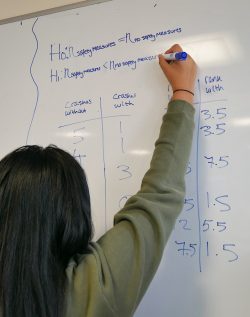Statistics or Mathematics – which is the right course for you?
A level Mathematics and A level Statistics are both outstanding courses, but which one would suit you and your career ambitions best? We have produced a comparison between the two courses – please take the time to download this leaflet to see what the differences are between the courses and which careers they suit best.
Why study Statistics?
- Careers with good statistical skills are often well paid, interesting and rewarding.
- Statistics is the most widely used branch of mathematics in industry and commerce.
- A Level Statistics is a versatile qualification respected by employers and enables learners to become better at analysing data and using this to make predictions about future events. Expertise in statistical models is a valued asset in medicine, finance, research and marketing.
- This course will suit those learners who enjoy applying their numeracy skills without the need to employ algebraic techniques.
Why study Statistics at Solihull Sixth Form College?
- The Mathematics Department is staffed by well qualified and experienced teachers of Statistics who use a variety of teaching methods to support your learning.
- Graphical calculators and online tools are used to support, develop and enhance many of the new concepts learnt.
- There is a team of enthusiastic teachers who create a vibrant environment with the learners’ interest at heart.
- There are well developed resources that are given to each learner at each point of the course.
Course Outline
Year 12
Learners will work with real data sets extending the work they have covered in GCSE Maths, such as the calculation of the numerical measures mean, median and mode, and the practical applications of correlation and regression, including Time Series Analysis in the world of business. Elementary probability theory is also studied, and the Binomial and Normal distributions are introduced. Different methods of sampling are studied, and we also study basic hypothesis testing. Topics which appear in such subjects as Biology, Psychology, Geography and Medicine include Chi-squared Contingency Tables, Spearman’s Rank Correlation Coefficient, and the Wilcoxon tests.
Year 13
The work on basic probability is extended to include Bayes’ theorem and in addition to revisiting the binomial and normal distributions we also introduce the Poisson and exponential distributions. We test the goodness of fit for various distributions and carry out hypothesis tests for two samples and paired samples. In addition, we consider the industrial and manufacturing application of statistics, including experimental design and analysis of variance.
Learners are expected to undertake 5 hours of work away from the classroom each week.
Assessment
No Coursework
Examination (100%)
Examining Board – Edexcel.
Special Entry Requirements
Grade 5 or above in GCSE Mathematics higher level. In addition, standard A level entry requirements apply.
Prohibited Options
Mathematics and Level 3 Mathematical Studies (Core Maths).
What do our learners go on to do?
There is a countrywide shortage of people with strong statistical skills, for example Medical Statisticians, so career prospects are enhanced by taking this course. A number of degree programmes contain significant amounts of statistics. These include Psychology, Biology, Business Studies, Management Science, Medicine, Dentistry, Geography, I.T., Government and Politics, Pharmacy and others.
Cost Implications
You will be expected to purchase a Graphical Calculator (specific model will be given at the start of the course) and some work will be done using computers.
Complementary Subjects or Enrichment Courses
Geography, Psychology, Business Studies, Economics, Biology, Chemistry, Accounting, Physical Education or any social science or humanities course.
Correct for September 2024 entry.


